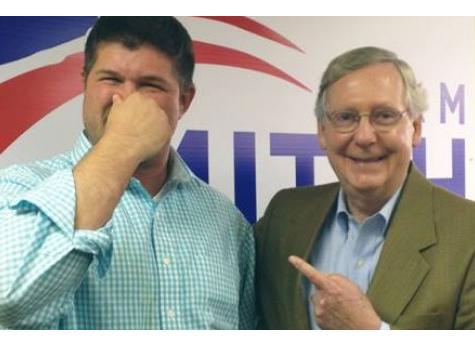
From Kansas to Kentucky, North Carolina to Alaska, Tea Party supporters who saw their endorsed candidates lose to establishment Republicans in U.S. Senate primaries are holding their noses as they prepare to put endangered Republican candidates over the top with their votes in closely fought U.S. Senate races.
Control of the U.S. Senate hangs in the balance.
Republicans must pick up 6 seats to obtain a 51 seat majority. On Friday, Real Clear Politics estimated that if the election were held today, Republicans would hold 47 seats, Democrats 45, with 8 seats up for grabs on Tuesday tossups that either party could take on election night.
Several of these tossup states went through bitter Republican primaries in which the establishment candidate defeated the Tea Party-endorsed candidate. While support for the establishment victors by the vanquished Tea Party primary opponents is a mixed bag, recent endorsements by some former intra-party foes, combined with pragmatic decision making in the minds of Tea Party voters around the country, may bring enough reluctant voters to the polls for Republican candidates to ease the party into a Senate majority.
In Kansas on Thursday, Tea Party-backed Dr. Milton Wolf endorsed incumbent Senator Pat Roberts (R-KS), albeit reluctantly, in his tight race with Democrat-backed “Independent” candidate Greg Orman. Wolf’s endorsement came one day after the Tea Party Patriots Citizens Fund, which had backed Wolf in the primary, endorsed Roberts.
Earlier this month in Alaska, both Tea Party-endorsed Joe Miller and Tea Party Express publicly supported Republican primary winner Dan Sullivan in his efforts to unseat incumbent Senator Mike Begich (D-AK). In Kentucky, Tea Party-endorsed Matt Bevin is “flirting with endorsing” incumbent Senator Mitch McConnell (R-KY), according to the Lexington Herald Leader. In North Carolina, Rand Paul, who endorsed Dr. Greg Brannon in the primary, has endorsed and campaigned for primary victor Thom Tillis in the general election race with incumbent Senator Kay Hagan (D-NC).
But endorsements from some former primary foes and national Tea Party organizations and leaders are not the only forces driving the overwhelming consensus among Tea Party activists and sympathizers around the country to hold their nose and vote for the lesser of two evils next Tuesday.
Another factor is the degree to which Republican candidates have been able to harness the anti-Obama, anti-Democrat sentiment sweeping the country. While voters prefer to vote for a positive agenda for the future, many Republican candidates are simply offering the old mantra, “vote for me because I’m not a Democrat.” Republicans who have endorsed a Tea Party-aligned message, however, have thrived.
As conservative icon Richard Viguerie, Chairman of ConservativeHQ.com told Breitbart News in an exclusive statement on Thursday, “When the GOP has a big victory this coming Tuesday night, they will owe a big debt to the Tea Party conservatives.”
“GOP leaders failed to present an alternative to the Obama Democrats’ failed policies in this election,” Viguerie told Breitbart News. “But Tea Party conservatives stepped into this vacuum and provided the leadership needed to nationalize the election around 3 issues: amnesty, national security, and the Obama Democrats culture of corruption, lies and lawlessness.”
These nationalized themes resonate with Tea Party activists, and candidates who have embraced them have seen their prospects for victory rise in the polls recently. Republican Senate candidates Scott Brown in New Hampshire and Tom Cotton in Arkansas, in particular, have jumped on the nationalization bandwagon by tying their incumbent Democratic opponents to President Obama, and each has seen a bump in recent polling.
In Arkansas, the most recent poll shows Cotton leads incumbent Democratic Senator Mark Pryor (D-AR) by an average of 7 percentage points. One New Hampshire poll shows that Brown, who has been trailing Democratic incumbent Senator Jean Shaheen (D-NH) for months, has now fought his way to a virtual tie.
In New Hampshire, as the National Journal reported recently, “the president’s popularity… has continued to wane as foreign policy and national security emerged over the summer as the dominant force of the campaign trail… In ads, Brown never misses the chance to show Shaheen smiling alongside the president. Whether the focus is the danger of immigrants slipping across the border of the potential for ISIS to attack, Brown has found a resonating message in tying Shaheen to Obama’s blunders.”
Despite months of speculation by Beltway pundits that rank and file Tea Party supporters might bolt the GOP for third party candidates in November’s election, recent polling data in several key Senate races suggests just the opposite. In fact, in the Kansas Senate race several dozen moderate Republicans, not Tea Party conservatives, have dropped their support for Roberts, the party’s standard bearer, and are actively supporting the Independent Orman. And while Wolf has endorsed Roberts, former Kansas Republican Senator Nancy Landon Kassebaum, the grande dame of the moderate faction of the Kansas Republican Party, has yet to offer her endorsement.
While polling that measures levels of Tea Party support for Republican candidates in the key contested Senate races is sparse, in at least one of these states, Kentucky, one recent poll shows they are overwhelmingly supporting the Republican. Earlier this month Western Kentucky’s Big Red Poll found that Tea Party activists overwhelmingly supported incumbent Senator Mitch McConnell over his Democrat challenger, Alison Lundergan Grimes, by a margin of 87% to 5%.
Tea Party activists who vote on Tuesday will overwhelmingly support Republican candidates, but it is still unclear if their turnout levels will be high, moderate, or low. Several other factors are in play that continue to make it anyone’s guess whether the Republicans will reach the magic 51 seats needed to take over the majority in the U.S. Senate.
On election night we will learn if the purported Democratic ground game superiority, along with the inevitable associated fraud, is sufficient to overcome the growing national antipathy to the policies of President Obama and the Democratic Party.

COMMENTS
Please let us know if you're having issues with commenting.